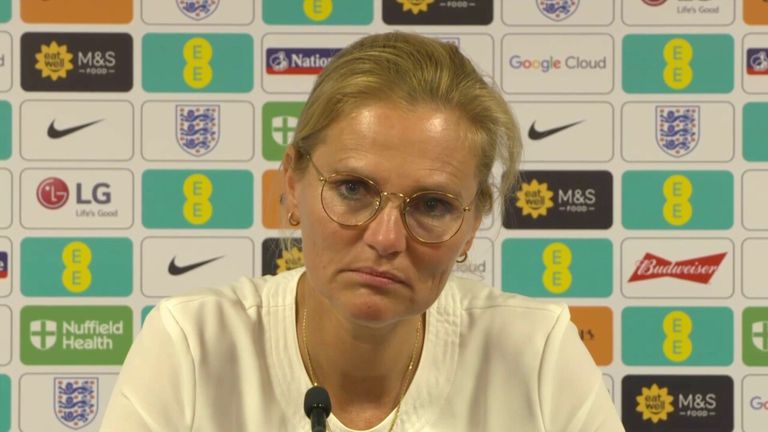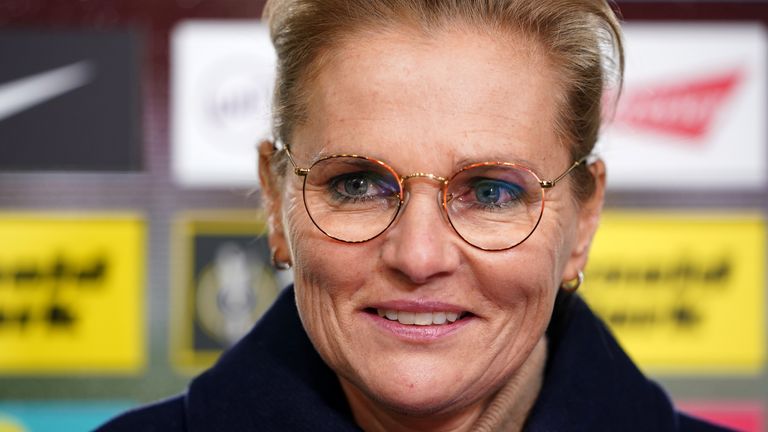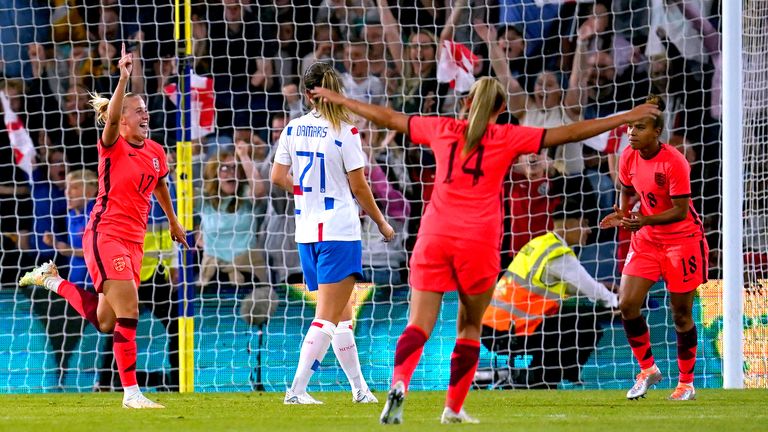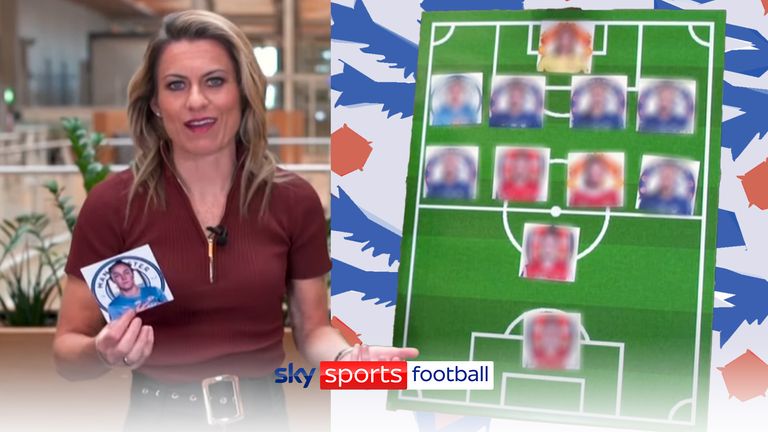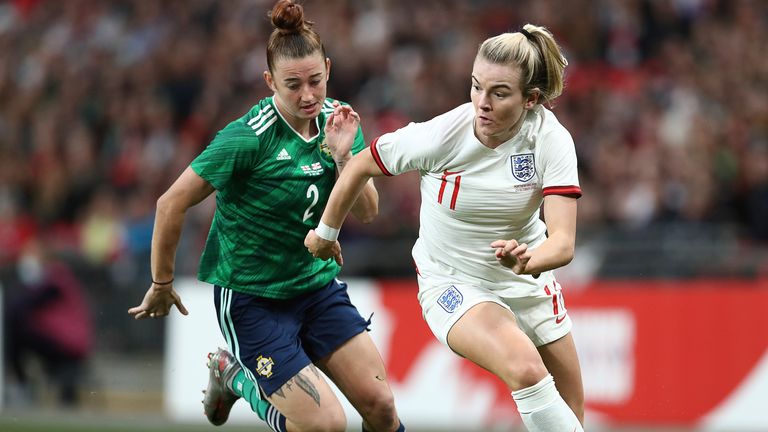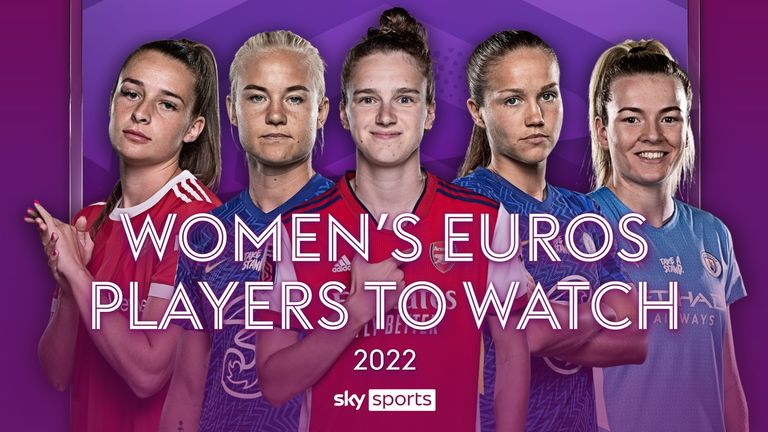
Home turf, familiar stadia, adoring crowds, an unbeaten run stretching back to September 2021 and a manager with a reputation of delivering continental silverware. What could possibly go wrong for England this summer?
This year’s tournament gives the Lionesses a chance to break through their own proverbial glass ceiling. Three sequential semi-final defeats at major tournaments are exactly why Sarina Weigman was targeted as Phil Neville’s successor. A tactician with a proven track record of winning big on the international stage.
Emulating Gareth Southgate’s sides’ achievements last summer, by making the tournament’s showpiece event at Wembley Stadium, will be the minimum aim. Going one step further will undoubtedly be the primary goal.
It’s set up for success – on paper. A home tournament adds pressure, but also brings with it a wealth of provision. And there is certainly an argument to suggest that the tournament’s 12-month delay – owing to Covid-19 – has been more of a help than a hindrance.
A relatively young squad has had time to grow richer in experience and forge the connections needed to succeed against the continent’s best talent, while domestically, the Women’s Super League is stronger than it ever has been. And so are its players. Only one of England’s final 23 – Rachel Daly of Houston Dash – spent the 2021/22 season competing outside of the WSL.
Weigman has replaced Neville to great effect – winning 12 of 14 games in charge – albeit England are yet to be truly tested and a better measure of the Dutchwomen’s credentials will be under the microscope of tournament favourites this July.
So, do the Lionesses have a chance of catapulting themselves to European glory this summer? Can they succeed on a ground where their male counterparts came up short and seal their first major tournament trophy? Can they eclipse European Championship bids of 1984 and 2009 where the Lionesses came so close, but ultimately fell at the final hurdle?
We examine their chances here.
Wiegman’s ruthless streak
As the England boss takes her seat ahead of England’s opening warm-up game against Belgium at Molienux, she looks relaxed, yet focused. Dressed in a pantsuit, her demeanour is purposeful. Business-like. It’s because she approaches every game, friendly or competitive, the same.
It’s a formula that has proven extremely successful in the past – particularly impressive given her home nation, with whom she steered to European grandeur in 2017, had a far less established tradition of footballing history in the women’s space than many competitors at that tournament. Two years later, the Netherlands nearly went one step further, eventually succumbing to the USA in 2019’s World Cup final.
Holland may have been considered contenders back then, but by no means were they favourites. The investment into the game, which has helped England’s development in recent years, was far below European peers at that point in time. In fact, if teams were ranked by financial backing back then, the Dutch should have finished sixth. Seven-time champions Germany were tipped to win it, closely followed by France.
But Wiegman clearly pays little attention to odds. She’s also got no time for romanticism. She’s pragmatic and straight-talking, which appears to have given this young England side a fresh lease of life. A new era has begun under her leadership, with Leah Williamson promoted to captain, Steph Houghton sidelined, and others given their first taste of tournament football – nine of her selection will feature at their first major tournament finals this summer.
She’s also picked the youngest group, by average age, since 2013’s edition of the competition, where England failed to progress past the group stages. It’s a risk, but a calculated one.
Lauren Hemp, at 21 years of age, is a perfect example of England’s evolution under Wiegman. She started all three of the Lionesses’ warm-up victories and was instrumental in each one. Being trusted with the “freedom to express herself”, the Man City forward explained after registering a goal and two assists in the 5-1 victory over the Netherlands, has helped her confidence grow. She also referenced how a change in “style and tactics” has benefited England’s methodology. They are adept at playing a variety of formations (noticeably 4-2-3-1 now), with multiple personnel changes, at no cost to the quality of performance.
They are no longer the underdogs, they are expected to win – but where there’s expectation, there’s pressure.
Home tournament jitters?
If England are going to succeed, where no national women’s side ever have before, they are going to need to handle the weight of expectation. It’s a blessing and a curse.
All of England’s group stage encounters and the tournament final at Wembley Stadium will be played in front of sell-out crowds, all with a large England contingent.
For a lot of Wiegman’s youthful squad, it will be some of the biggest live audiences they’ve ever experienced. It should provide the Lionesses with plenty of support and encouragement from the stands, but they must be careful not to over-indulge. Stay concentrated on the task ahead.
“There’s going to be criticism, every single day in football, that’s just part and parcel,” vice-captain Millie Bright said at a Women’s Euro launch event in March. And it will be her job, as one of the more mature members of the squad, to help manage emotions when things aren’t going England’s way.
Until now, 14 games into her tenure, Wiegman’s leadership has hit very few stumbling blocks. In fact, the Lionesses have only been behind in games, or game rather, for a meagre 10 minutes – against the Netherlands before Lucy Bronze equalised. It does mean that a large proportion of this new-look squad are unfamiliar with adversity.
Lionesses’ fans need only remind themselves of 2019’s World Cup semi-final exit, where Houghton’s agonising penalty miss in the 80th minute cost them dearly. Pressure in big moments matters.
Wiegman herself, however, is no stranger to hardship. Her side were forced to come from behind in 2017’s final after all, going down by a goal to Denmark in the opening six minutes.
England must therefore view this tournament’s pressure as a challenge, not a threat, and harness the power of home crowds to carry them without being overawed by its might.
Luck or judgement?
Or both?
In tournament play, any successful team needs an element of fortune on their side. Speaking about England’s chances of emerging triumphant this summer, former Lionesses boss Hope Powell concluded: “It’s about a bit of luck…what group you’re in, what’s your pathway. If England can take the luck and run with it…they have a great chance.”
England, placed in Group A, shouldn’t fear any opposition, such is the talent among their squad. But they can make their potential route to the final smoother by winning their group.
Wiegman’s side are well-positioned to do so, having beaten both Austria and Northern Ireland in World Cup qualifying recently, but must remain vigilant having been tethered to Group B – the competition’s ‘group of death’.
Should they finish runners-up, they will face the winner of that quartet – which contains favourites Spain, 2017 finalists Denmark and Europe’s most decorated side Germany. High stakes.
Recent history would suggest England have the firepower to beat the Germans – as they did at this year’s inaugural Arnold Clark Cup. Facing the Spaniards, however, boasting Ballon d’Or winner Alexia Putellas and co so early into the knockout phase would be less favourable. Finishing second also puts them at greater risk of meeting France earlier, with Les Bleues touted as favourites to win their respective group.
It goes without saying that topping Group A will be England’s first and foremost ambition, to gather momentum, but predominantly to make their journey to Wembley simpler – in theory.
Winning any major tournament is a massive undertaking, no matter the course. But the Lionesses have never been better equipped to do so. Not only that, mitigating circumstances – Wiegman’s tournament nouse, the home advantage, and a favourable draw – only serve to enhance their plight. Utilise those factors to good effect and they have every chance of claiming a historic first European crown this summer.
Follow Euro 2022 across Sky Sports
Keep up with all the latest from Euro 2022 across Sky Sports and Sky Sports News this summer.
Coverage will be anchored by Sky Sports WSL presenter Caroline Barker, alongside Jessica Creighton and Kyle Walker. Meanwhile, Karen Carney, Sue Smith, Courtney Sweetman-Kirk and Laura Bassett will give analysis throughout the tournament.
They will also be joined by experienced England goalkeeper Karen Bardsley and Manchester City defender Esme Morgan.
The pundits and presenters will work from the Sky Sports Women’s Euro 2022 Mobile Presentation Bus, which will follow the Sky Sports News team around the country to the various stadiums where matches are being played.
In addition, Sky Sports’ Essential Football Podcast will be rebranded for the tournament to Sky Sports Women’s Euros Podcast from 21 June. Hosted by Charlotte Marsh and Anton Toloui, it will feature exclusive news and player interviews in addition to a strong programme line-up around the tournament.
Euro 2022: The groups…
Group A: England, Austria, Norway, Northern Ireland
Group B: Germany, Denmark, Spain, Finland
Group C: Netherlands, Sweden, Portugal, Switzerland
Group D: France, Italy, Belgium, Iceland
Euro 2022: The schedule…
Group stage
Wednesday July 6
Group A: England vs Austria – kick-off 8pm, Old Trafford
Thursday July 7
Group A: Norway vs Northern Ireland – kick-off 8pm, St Mary’s
Friday July 8
Group B: Spain vs Finland – kick-off 5pm, Stadium MK
Group B: Germany vs Denmark – kick-off 8pm, London Community Stadium
Saturday July 9
Group C: Portugal vs Switzerland – kick-off 5pm, Leigh Sports Village
Group C: Netherlands vs Sweden – kick-off 8pm, Bramall Lane
Sunday July 10
Group D: Belgium vs Iceland – kick-off 5pm, Manchester City Academy Stadium
Group D: France vs Italy – kick-off 8pm, New York Stadium
Monday July 11
Group A: Austria vs Northern Ireland – kick-off 5pm, St Mary’s
Group A: England v Norway – kick-off 8pm, Brighton and Hove Community Stadium
Tuesday July 12
Group B: Denmark vs Finland – kick-off 5pm, Stadium MK
Group B: Germany vs Spain – kick-off 8pm, London Community Stadium
Wednesday July 13
Group C: Sweden vs Switzerland – kick-off 5pm, Bramall Lane
Group C: Netherlands v Portugal – kick-off 8pm, Leigh Sports Village
Thursday July 14
Group D: Italy vs Iceland – kick-off 5pm, Manchester City Academy Stadium
Group D: France vs Belgium – kick-off 8pm, New York Stadium
Friday July 15
Group A: Northern Ireland v England – kick-off 8pm, St Mary’s
Group A: Austria vs Norway – kick-off 8pm, Brighton and Hove Community Stadium
Saturday July 16
Group B: Finland vs Germany – kick-off 8pm, Stadium MK
Group B: Denmark vs Spain – kick-off 8pm, London Community Stadium
Sunday July 17
Group C: Switzerland vs Netherlands – kick-off 5pm, Bramall Lane
Group C: Sweden vs Portugal – kick-off 5pm, Leigh Sports Village
Monday July 18
Group D: Iceland vs France – kick-off 8pm, New York Stadium
Group D: Italy vs Belgium – kick-off 8pm, Manchester City Academy Stadium
Knockout phase
Quarter-finals
Wednesday July 20
Quarter-final 1: Winners Group A v Runners-up Group B – kick-off 8pm, Brighton and Hove Community Stadium
Thursday July 21
Quarter-final 2: Winners Group B v Runners-up Group A – kick-off 8pm, London Community Stadium
Friday July 22
Quarter-final 3: Winners Group C v Runners-up Group D – kick-off 8pm, Leigh Sports Village
Quarter-final 4: Winners Group D v Runners-up Group C – kick-off 8pm, New York Stadium
Semi-finals
Tuesday July 26
Semi-final 1: Winners quarter-final 1 v Winners quarter-final 3 – kick-off 8pm, Bramall Lane
Wednesday July 27
Semi-final 2: Winners quarter-final 2 v Winners quarter-final 4 – kick-off 8pm, Stadium MK
Final
Sunday July 31
Winners semi-final 1 v Winners semi-final 2 – kick-off 5pm, Wembley
